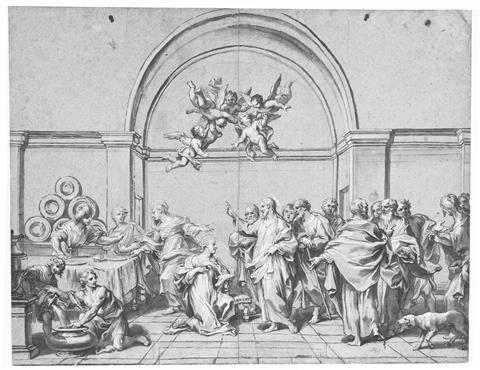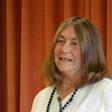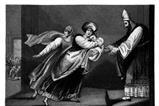Elaine Storkey takes a close look at what the Bible has to say about educating women, and delves deep into the often quoted 1 Timothy 2
Study passages: 1 Timothy 2:8-15
Religious attitudes to women’s education have been contentious in cultures through the ages. Twelve years ago, teenager Malala Yousafzai was shot for opposing the Taliban’s restrictions on women’s education in Pakistan, her home country. For three years she’d written a pseudonym blog about girls and studying, alerting people to increasing local military activity and threats to her school (over 100 girls’ schools were blown up by the militia). She appeared on podcasts, made films in Urdu about girls’ education, and was interviewed by the BBC. Once her cover was blown, however, she became a target and the Taliban hunted her. The fact that a young, educated, peace-loving teenage girl was able to challenge a repressive, armed regime was too much for them. After the assassination attempt, she was flown to the UK for surgery. Thankfully she survived to continue her campaign from Birmingham and then Oxford. In December 2014, she became the youngest person ever to receive the Nobel Peace Prize.
Women’s education continues to be an issue with despotic regimes. Last year a group of female activists staged a protest rally in the Afghan capital, Kabul, demanding that Taliban authorities reopen schools and universities for girls nationwide.
Wherever there are bids to deny education for girls and women, the motivation is similar. It is to restrict women from ever challenging the authority of the men who are in control. It reinforces the stereotypes and religious attitudes towards women held by the controlling authoritarian power groups. For them, women have no authority or voice. They are to be subjugated into compliance; silenced and excluded. It seems that educated women, informed in law, history, science, medicine or languages, can be dangerous to those with little knowledge who rule through guns and violence.
Women and learning in the Bible
It is a relief to turn to the New Testament and see women encouraged to learn and use their intelligence. Stories interspersed in the biblical text give us a glimpse of women whose minds were taken seriously. John’s Gospel shows us Jesus engaging with a Samaritan woman who was full of questions about culture and religious practices (John 4). He answered her questions by teaching her about who God is, and how we should worship.
Girls’ education has always been one of the outcomes of Christian missionary work
We’re shown Mary, who joined the disciples to be taught by Jesus, rather than becoming overheated by domestic chores like her sister. Instead of being put in her place as a ‘woman,’ her readiness to learn was praised by Jesus (Luke 10:38-42). Then, Mary Magdalene was commissioned by Jesus after the resurrection, to instruct the disciples that he had risen (John 20). In Acts, Luke introduces us to women already educated – like Priscilla, who taught Apollos and corrected his theology (18:24-26), and Lydia, who gathered a group of like-minded women to be educated by Paul (16:13-15).
In his second letter to Timothy, Paul highly commended Eunice and Lois for having taught the young leader about the Christian faith (2 Timothy 1:5). Some biblical narratives even tell us of women being educated by angels! Mary, who was unexpectedly (and inexplicably) pregnant, listened to the angel who instructed her (Luke 1:26-38); the women who went to the tomb were reminded by two angels what Jesus had already taught them (Luke 24:1-8).
It is not surprising, therefore, that girls’ education has always been one of the outcomes of Christian missionary work, and has accompanied the spread of Christianity across the world. It’s not surprising either that many of those missionaries who preached the good news of Jesus were themselves educated women, with skills enabling them to serve those cultures so effectively.
So, I feel very sad when, despite all this affirmation in Christian teaching and history, I hear from some Christian women today that they can still be discouraged from learning. When women’s talents are not fully appreciated, they can be held back by churches imposing restrictions. Often this is done because people believe they are being biblical. They fail to see all the biblical stories that show something different and interpret passages in a way that reinforces the hierarchy between men and women. One passage often cited as a justification for restraining women is 1 Timothy 2:8-15. It contains strange elements, so I think it may be worth looking again at what it says.

Delving deeper into 1 Timothy 2
The passage begins by urging men to pray without arguing with one another, and women to dress modestly, and then goes on, seemingly, to limit women from teaching or holding authority in the Church. The reason given is because Eve, not Adam, was the one easily deceived. And the passage ends with odd assurances that women will be saved through childbearing. However, we know from the whole of the New Testament that women are not saved through childbearing but through Christ’s atoning death on the cross. Most scholars think this reference is back to Eve and her ‘children’. But we need to dig more deeply to understand what the whole of the passage is about.
We begin by noticing that the passage opens with the word “therefore”. This immediately alerts us to look at what the writer had been saying to Timothy in the previous chapter. He told him to “stay there in Ephesus so that you may command certain people not to teach false doctrines any longer or to devote themselves to myths and endless genealogies” (1 Timothy 1:3-4). This, in fact, is the key to the whole passage: to stop false teachings. We know from Acts that Ephesus was the “guardian of the temple of the great Artemis [Diana] and of her image, which fell down from heaven” (Acts 19:35). A female goddess was seen as the origin of humanity and the focus of idol worship. People were also being converted to Christ from sorcery and witchcraft (Acts 19:19-20). We know from Paul’s letter to the Ephesians that the city was a place of spiritual warfare, and that God’s people needed his armour to fight against “rulers”, “authorities” and “powers” (Ephesians 6:12). In such an idolatrous culture, it would be all too easy for false doctrine to distort true faith.
Historical sources shed more light. Women in Ephesus possessed power, influence and wealth, reflected often in the way they dressed. They held public positions and were fully involved in goddess cults as priests and cult leaders. According to Pausanias, a noted writer in the second century, the temple of Artemis even became a place for the powerful Amazon women to reside and perform rituals. It would be easy also for women converts with positions in Ephesian culture to assume they could switch to being leaders in the church. So, we begin to understand why the writer to Timothy wanted Christian women to avoid any identification with Ephesian idolatry. In both their appearance and their attitudes, their temple had to be that of the Holy Spirit.
When we look at 2 Timothy we discover that false leaders often targeted the homes of women on the fringes of Christianity who knew little true faith, and took advantage of their gullibility (2 Timothy 3:2-8). Seen in this light, the embargo on women teachers makes even more sense. It was utterly vital for the church in Ephesus to appoint only those who would teach the truth about Jesus and rein in those who hadn’t done their homework! It was not to deny all women the right to teach (the Greek word here, epitrepo relates to specific, limited situations), just those in Ephesus who might propagate bad theology. And the ‘authority’ they were not allowed was authentes: a Greek word used only once in the whole New Testament, probably to indicate a particular kind of strident or inappropriate exercise of power.
The focus of the passage was the safeguarding of the early Church from heresy and untruth. Eve was not to take on the mythology of Artemis as the origin of life and wisdom, but be seen as a woman who was deceived. Christian women in Ephesus were to avoid being deceived. How was that to be done? By women learning “in quietness and full submission” (1 Timothy 2:11). They needed to shut out the noises and falsehoods of the idolatrous culture and fully submit themselves to studying the teaching of Jesus and the apostles.
How does this speak to us today?
This message is also for us. Today we’re in a privileged culture where women have access to education in almost any area they choose. Let’s take the opportunities to probe ever more deeply into our biblical faith, so that our Church today can remain secure and confident in the truth of Jesus and shun the idols of our own culture.

































No comments yet